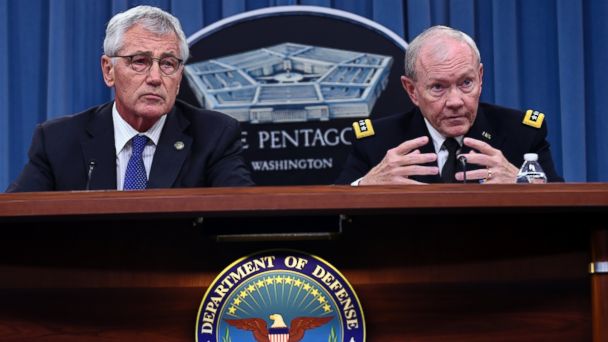Chuck Hagel and Martin Dempsey Explain Support for 21-Day Quarantine for Troops
Safety concerns prompted the decision to put in place a 21-day quarantine for American troops serving in the Ebola mission in West Africa, top Pentagon officials said today.
Gen. Martin Dempsey, chairman of the Joint Chiefs of Staff, told reporters today that he and the other Joint Chiefs of Staff believe a quarantine makes sense for the 4,000 troops that will be assigned to Liberia for a six-month period.
Defense Secretary Chuck Hagel signed off on Wednesday on the recommendation made by the Joint Chiefs that the Defense Department impose a quarantine for returning troops. That order went further than guidelines from the U.S. Centers for Disease Control and Prevention that travelers from Liberia should self-monitor for symptoms for 21 days, but not under quarantine conditions.
"We did factor in science," Dempsey said. "Physics is the science we factored in."
Talks With Ebola Nurse Kaci Hickox Fail, Governor to Use 'Full Authority'
Dempsey made a distinction between civilian health care volunteers treating Ebola-infected patients and the large military force headed to Liberia.
"This is not about small groups of people who are transient. There's protocols for that," Dempsey said. "It's also not about health care professionals in direct contact with Ebola. There's protocols for that."
While American troops will not be providing any health care, their six-month deployments will keep them there longer than health care volunteers who stay for one to two months because of what he called the "intense environment for them."
"This is about a major military operation and big things on a global scale. And so we took a conservative approach and we'll assess it in 45 days," said Dempsey. "But we're going to keep them safe."

(Susan Walsh/AP Photo)
Hagel said that his decision to agree to the Joint Chiefs recommendation "was thoroughly reviewed by health care professionals in each of the services in the Office of the Secretary of Defense."
Hagel said he was mainly focused on the security of the men and women in uniform, which is why he thought "it was a smart, wise, prudent, disciplined, science-oriented decision based mainly on what the chairman just articulated, but also the reality of what else is going on."
Hagel acknowledged the public debate about "every decision, every issue, and every part of that by decision-makers." But he said "You have to analyze it based on what you think is the right thing to do for your people, and that's the decision we made and why we made it."